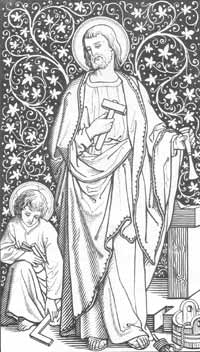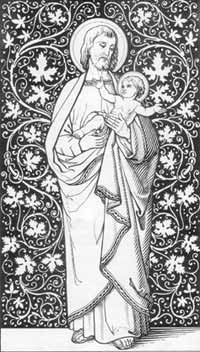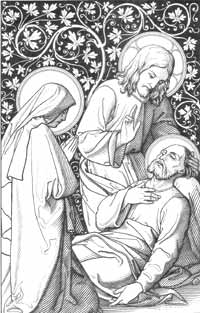Blessed Be Saint Joseph
HIS ORIGINS are obscure, the details of his life mostly conjecture. We do not know what he looked like, his age at any given time, when he died, and very little that he ever said. What we do know, by the things he did, is that he totally delivered whatever God asked of him and thereby has received his own niche in the Divine Praises, the only mortal to be specifically honored other than the Blessed Virgin.
Saint Joseph, her most chaste Spouse.
It is hardly original to say that the New Testament accounts of people and events came about because of their association with Our Lord; nevertheless, Saint Joseph is unique even with this genre. Because so little about him has been documented, he is an unknown quantity; because what is known is so remarkable, he is revered and respected. From his first appearance in the Gospels, to his last, the ways he handled the often incomprehensible situations in which he found himself prove him worthy of the attributes ascribed to him
Researching Saint Joseph is intriguing. Apocryphal gospels, "traditions" and various writings abound, but details furnished therein are frequently inconsistent with each other, as well as improbable. Thus the reconstructive process must make do with the information in the Gospels, which is restrictive indeed, and expand it with likely assumptions and supposition.
The Gospels trace Joseph's ancestry back to King David, although the line of descent is shown as being through Solomon in one account (Mt. 1.2) and through Nathan in the other (Luke 3.27). However, as pointed out in the New Catholic Encyclopedia, Volume 7, this discrepancy in no way disturbs Jesus' right, by being the legal son of Joseph, to be called the "Son of David" (Mt. 15.23), a recognized title of the Messiah (Mt. 22.42).
Once the factual world of genealogy is left behind, the assumptions take over; then commentary often carries the disclaimer of "apparently" or "probably." Thus we say that Joseph was apparently living in or near Nazareth at the time of his betrothal to Mary, that he probably plied his carpenter's trade thereabout. (An example of the way in which the unknown area of Joseph's life lends itself to the imagination is found in the beautiful fictionalized version of the coming of the Messiah by the English writer, Norah Lofts. She makes a subtle reference to Joseph being one of the carpenters building "a house at Cana," leaving it to the reader to draw a provocative conclusion.)
Perhaps the elaborations to Joseph's life and the legends take on a certain plausibility because the documented events are so exceptional. We first hear of Joseph within the context of his bethrothal to Mary. A bethrothal, in their culture, though less than marriage, was more than an engagement. It was a formal contract followed some months later by the wedding, at which time the man took the woman into his house and the union consummated. During the betrothal period, wherein infidelity was regarded as the same as adultery, Joseph discovered that Mary was with child. The Gospel account makes us aware that this had happened by the Holy Ghost, but Joseph did not yet know the cause of her pregnancy and was understandably troubled. Known as "just," the equivalent of a Hebrew word that designates a man who is very conscientious in the observance of the Law, he knew that the Law's application in this case would not allow him to consummate a marriage with a woman who had committed adultery. Joseph's behaviour at this point gives us some insight into his character, showing him possessed of compassion and a capacity for caring. We are told that he did not wish "to expose her to reproach" and "was minded to put her away privately" which was the type of divorce whereby the reason for it did not have to be revealed. Joseph was human, with divine guidance in making decisions or solving dilemmas still in the future, yet he intuitively took the first step toward a lifetime of sheltering the woman who was to bear the Son of God. His perplexity was resolved when, in a dream, an angel of the Lord revealed to him the sacred mystery of the virginal conception of Jesus. "Do not be afraid, Joseph, Son of David, to take to thee Mary thy wife, for that which is begotten in her is of the Holy Ghost" (Mt. 1.20). Responding at once to the responsibility he had assumed at his betrothal to Mary, Joseph went ahead with the wedding ceremony.

It is frustrating that chroniclers of the day were not more inclined to describe the people they wrote about. How especially valuable background detail would be at this point! Age is a particular enigma. We generally accept that Mary was very young; art and tradition suggest that Joseph was not. Opponents of this conclusion point to the Law's teaching at that time that a man should marry by his nineteenth birthday, and that Joseph, whose care for the Law has already been noted, would hardly disregard this stipulation. Set against this theory is consideration of the extraordinary situation that will exist. The New Catholic Encyclopedia notes that "while the marriage of Joseph and Mary was a genuine marriage, it was never consummated, according to the Catholic doctrine of the perpetual virginity of Mary which is based on tradition that goes back to the earliest age of the Church." Therefore, Mary's spouse will be a husband without conjugal privilege and, as Butler's Lives of the Saints tells us, He will be "the protector of our Lady's good name, and in that character of necessity the confidant of Heaven's secrets"; he will be "the foster-father of Jesus, charged with the guidance and support of the holy family..." This brings the supposition that a man of some maturity would likely be more disposed to assuming such awesome responsibilities; thus Joseph is seen as being older, perhaps in his late thirties. But whatever his age, and whatever he might heretofore have expected his life to be, Joseph now took on a role unique to man's experience.
The Gospels move along to the birth of Jesus and in the recounting of this wonderful event we see, in the magnitude of God's plan, how seemingly unrelated elements find their places—such as the timing of a Roman Emperor's desire for a census. A decree went forth from Caesar Augustus "that a census of the whole world should be taken" (the "whole world" to the Roman mind was likely bounded by those provinces under Roman rule), and this required that everyone go "each to his own town to register" (Luke 2.3). The Roman tendency was to take little interest in the genealogy of the populace in the provinces, but to be extremely meticulous toward ownership of property, be it land or human. From this rationale comes the theory that the purpose of the census was to have the owner of a property go to register where the property was located. According to The New Catholic Encyclopedia, Joseph probably (there's that word again) owned property in Bethlehem and that necessitated his journey there. In any case, the decree caused Joseph to go to Bethlehem, and, as Mary accompanied him, placed her there when, "the days for her to be delivered were fulfilled. And she brought forth her firstborn Son" (Luke 2.6-7), just as the prophet had foretold: "And thou, Bethlehem ... out of thee shall he come forth ... that is to be the ruler in Israel; and his going forth is from the beginning, from the days of eternity" (Mich. 5.2).
If ever Joseph's steadfastness was to be measured, no better time could be found than in the following days. His life became an amalgam of the incredible and the mundane. Although virtually his entire awareness must have been dominated by the miraculous event which had just happened, and the knowledge that he and Mary shared, nevertheless there were still responsibilities to be discharged. Besides meeting his family's material needs, there were the ritual ceremonies to be performed, as though this had been any ordinary birth, any ordinary baby, and any ordinary mother. The first was the circumcision of our Lord, falling eight days after His birth, at which time Joseph, as the legal father, was privileged to make known the name of the Child: "and he called his name Jesus" (Mt. 1.25).
Later, Joseph, with Mary, "took him up to Jerusalem to present him to the Lord" and to "offer a sacrifice according to what is said in the Law of the Lord 'a pair of turtledoves or two young pigeons' " (Luke 2.22-24). This ceremony occurred when the days of Mary's purification were fulfilled, for even though Mary was immaculate and had conceived and borne Jesus in inviolate virginity, she submitted to Mosaic Law and its ritualistic disciplines, one of which dictated a period of forty days seclusion for a mother following the birth of a son.
Then Joseph's life received another of its great upheavals. The Magi reached Bethlehem, still following the star which had guided them from the East "and entering the house, they found the child with Mary his mother, and falling down they worshipped him" (Mat. 2.11). Unfortunately, for the well-being of the Holy Family, in their search for "he that is born king of the Jews" (Mt. 2.2), the wise men had encountered King Herod. By their inquiries they had made him aware not only of the impending birth of Jesus but the approximate location as well. This unintentionally created jeopardy was partly mitigated when they did not return to Herod to report their findings, having been warned in a dream not to do so. When the Magi had left, we are told that "an angel of the Lord appeared in a dream to Joseph, saying 'Arise, and take the child and his mother, and flee into Egypt and remain there until I tell thee. For Herod will seek the child to destroy him.' So he arose, and took the child and his mother by night, and withdrew into Egypt" (Mt. 2.13-14).
This creates an image of the utmost poignancy; an arduous journey made in haste and apprehension to an undetermined destination far from friends, family and an accustomed way of life. Yet Joseph's response to the angel's message showed again that he did what was asked of him by putting himself and whatever resources he had at his command between a hostile world and those he had promised to shelter.
The wisdom of the flight into Egypt and the stay there until Herod's death was all too graphically proven by Herod's action when it became apparent to him that he was not going to get any assistance from the Magi in locating the child. Employing the same penchant for murder by which he had already more than once eliminated real or fancied threats to his interests he caused to be slain all of the boys in the Bethlehem area who were two years old or under.
The sojourn in Egypt ended when Herod was dead. We are told that "an angel of the Lord appeared in a dream to Joseph in Egypt, saying 'Arise, and take the child and his mother, and go into the land of Israel, for those who sought the child's life are dead.' So he arose and took the child and his mother and went into the land of Israel. But hearing that Archelaus was reigning in Judea in place of his father Herod, he was afraid to go there; and being warned in a dream, he withdrew into the region of Galilee, and he went and settled in a town called Nazareth" (Mt. 2.19-23).
Thus, in a manner of speaking, in a few years' time Joseph had come full circle. He was back in Nazareth where it all began. It is to be hoped that his life now entered a period of stability, free of the crises which had marked it heretofore.
By his presence in Jesus' life, Joseph supplied a unique father figure, the role model, as today's terminology would have it. In Butler's Lives of the Saints, we find "by Joseph's fatherly love, authority and watchful service—all implied in the traditional title of foster-father of Jesus—Joseph appeared publicly as if he were the natural father of Jesus, thus shielding the virginity of Mary and the reputation of Jesus." This account further comments that it was Joseph's trade that Jesus learned, his manner of speech that the boy would have imitated, and his education to a great extent resting with Joseph. The degree to which Joseph seems to have been invested with full paternal rights can be found in the phrase used by the Blessed Virgin herself: "Thy father and I."
When Jesus was twelve years old, he accompanied Joseph and Mary to Jerusalem for the Feast of the Passover and "when they were returning, the boy Jesus remained in Jerusalem, and his parents did not know it. But thinking that he was in the caravan, they had come a day's journey before it occurred to them to look for him among their relatives and acquaintances. And not finding him, they returned to Jerusalem in search of him" (Luke 2.43-45). Of course, as we know from this familiar story, they found him in the temple, confounding the teachers there with his knowledge. "And his mother said to him, 'Son, why has thou done so to us? Behold, in sorrow thy father and I have been seeking thee.' " Whereupon he returned to Nazareth and "was subject to them."
This episode is the last one in which Joseph makes a gospel documented appearance. Following another great void of some eighteen years, the gospels resume, giving their accountings of Jesus' ministry, but there is no more mention of Saint Joseph. Perhaps, having served our Lord in the capacity for which he was divinely selected, for as long as the need existed, he was taken to his heavenly reward. No one comes to mind who deserves it more.
We are told that "since the bond of marriage existed between Joseph and the Blessed Virgin, there can be no doubt that more than any other person he approached the supereminent dignity by which the Mother of God is raised far above all created natures" (Leo XIII, Quamquam Pluries, August 15, 1889). The Church in practice venerates Joseph as second only to Mary, and for countless years he has been invoked as the patron of workmen, the dying, the poor, fathers, families, those in authority; he is the officially declared patron of countries and causes. This "just man" speaks to us across the centuries by the quality of his submission to God's will, in which there is no hint of rebellion or even questioning. It was both complementary to and supportive of Mary's acceptance of her destiny: "Behold the handmaid of the Lord; be it done to me according to Thy word" (Luke 1.38).
Saint Joseph, her most chaste Spouse.


